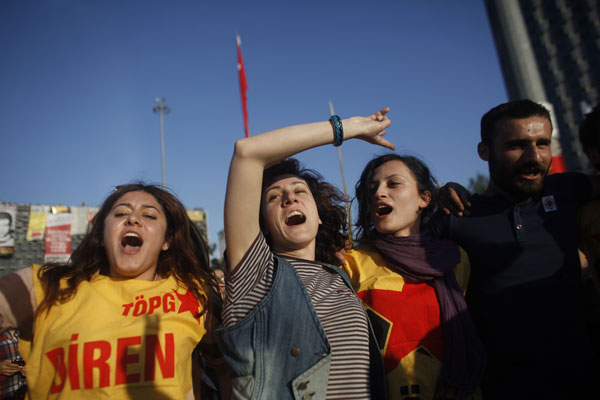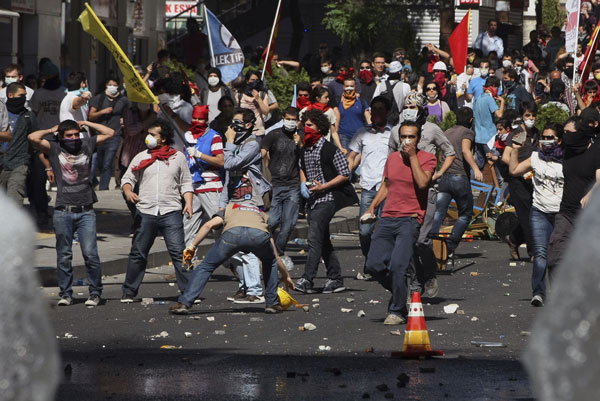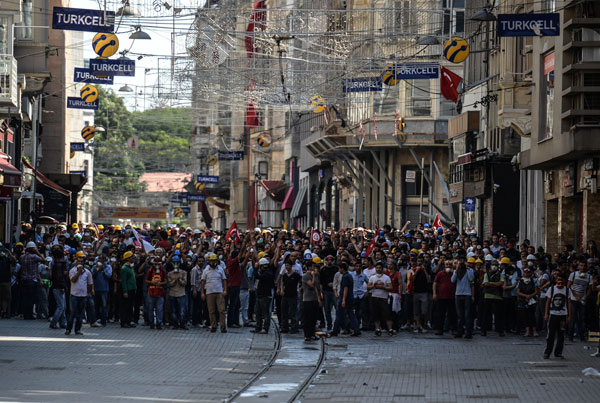From A World to Win News Service
Turkey: A Movement Touching Deepening Chords
June 30, 2013 | Revolution Newspaper | revcom.us

Part of a protest at Taksim Square in Istanbul, Monday, June 3, 2013. Photo: AP
June 17, 2013. A World to Win News Service. The situation in Turkey has taken another turn. Turkish Prime Minister Recep Tayyip Erdogan has apparently adopted a "double or nothing" strategy of seeking to restore stability mainly by crushing resistance, escalating the political and ideological conflict, and bringing violence to a new level. At the same time, this resistance to the regime has struck a deep chord among the youth and throughout Turkey. It is not an everyday occurrence for any society to be so clearly split into two opposing camps.
The police have been gassing and beating demonstrators mercilessly since the beginning, but never was the nature of the state Ergodan leads as obvious as on the night of June 15. Tightly closed ranks of thousands of police with their shields tilted above their heads, lined up like phalanxes of ancient Roman soldiers, moved through Taksim Square in an attempt to end the weeks of protest by sheer force no matter what the cost.

Thousands of Turkish youths gather at Ankara's main Kizilay Square in the face of government attacks on them, June 1, 2013.
Photo: AP /Burhan Ozbilici
Most protesters were unprepared for the scope and viciousness of this assault. The attack was especially unexpected because even at his most menacing, Erdogan had given them until the next day before he said the security forces would clear them out. They retreated to adjacent Gezi Park, where they were able to stand up to water cannons, enormous clouds of gas, and clubbing for more hours than seemed possible.
The regime brought in police from all over the country. It sent in the gendarmes—a military formation not usually used in the streets—in an attempt to keep demonstrators from crossing over from the Asian side of the Bosphorus Strait and reaching Taksim Square. They failed to stop people on the bridge, but attacked them brutally when they reached the European side.
The authorities have also changed the composition of their chemical weapons, the hi-tech sprays and gases used against protesters, so that not only do eyes sting horribly but people vomit and their flesh sometimes shows the distinctive marks of chemical burns.
Yet while the regime now holds Taksim, many people still gather in the surrounding neighborhoods and elsewhere in Istanbul ready to confront whatever the regime uses against them.
At nine o'clock in the evening, people stop whatever they are doing and make noise for 15 minutes in solidarity with the movement and each other. This is particularly powerful in the neighborhoods around Taksim where many residents have come to support the youth against the police, but to some degree throughout Istanbul. People lean out of their apartment windows to bang on pots and pans, thump metal lampposts if they happen to be in the street, and even in cafes and restaurants stand up and bang their plates and glasses as loudly as possible.
Similar scenes are taking place in Ankara and Izmir, Turkey's second- and third-largest cities.
Erdogan successfully called huge rallies in Ankara and Istanbul. The event in Istanbul was meant to prove that his support is strong not just in Anatolian towns but among the urban population and commercial classes of the biggest city. Erdogan has tried to set his social base on fire with religion and a sense that he and they are victims of unnamed enemies, implicitly "the West" and Westernized people in Turkey. In an almost unbelievable outburst of Turkish chauvinism at its most blatantly racist, he resorted to telling his supporters that these enemies consider them uneducated "n*ggers".
His claims that the protesters in their multitudes are all "terrorists" or at least manipulated by "terrorists" have begun to fall flat. When he called for mothers to come to Gezi Park and get their children, hundreds of mothers came to form a protective ring around all the demonstrators. The association of lawyers held a demonstration to demand the release of their colleagues jailed for defending protesters, and the doctors' and dentists' association did the same to defend the medical personnel targeted by the police, beaten, and jailed for taking care of the wounded. Several trade union confederations have gone on strike to demand a halt to the police attacks.
This pushed Erdogan into yet more flaming hysteria against the protest movement, denouncing it as part of a conspiracy by the Western powers, Israel, and international financiers determined to deny Turkey its rightful place as a modern, Islamist regional powerhouse. (He also implies that they are working through the Kurds to dismember Turkey, although the Kurdish PKK is still trying to preserve its entente [agreement or understanding] with the governing AKP.)
As if Erdogan himself—as the latest in a line of leaders of the Turkish state going back to Ataturk and the civilian and military figures who followed the founder of the republic, along with the Turkish ruling class as a whole—has not sought Turkey's "rightful place" as a haven (and heaven) for foreign capital and as junior partner to the U.S. and European imperialists. As if Erdogan himself were not an expert in interfering in other countries' affairs, hand-in-hand with the U.S. (and Israel), from Iraq and the Republic of Georgia to Libya and Syria.
There is no need to imagine a foreign conspiracy to explain why his policies and his system have brought so many people to the streets against the way things are and are going in Turkey.
The regime has made efforts to peel off some of the older and more established middle class people who make up an important base of support for the movement in the streets, both by making promises (such as not to tear down Gezi Park without a court process and possibly a referendum) and threats (to consider any person found near Taksim Square a "member of a terrorist organization," a charge as potentially serious legally as it is ridiculous). Many people came to Taksim to celebrate, not to resist the police, and the unrestrained brutality against anyone in the street—as if every onlooker, doctor or lawyer, casual protester, football club supporter, and hardened street fighter were all "terrorists"—has given some people pause. But at the same time, this has been an important factor in a emergence and spreading of a disbelief in the regime's legitimacy.
Erdogan orchestrated the clearing of Taksim Square as a kind of opening act to his Istanbul rally. Both events were meant to signal that the regime has a strong social base, especially among those benighted by religion, and has far more violent power than many protesters imagined. But seeking to further divide society is a perilous operation with unpredictable consequences. Such resorting to open terror and the threats to bring in the army to crush unarmed political protesters, are not necessarily advantageous to the regime in the short or long run.
The core of this movement seems to be in more of a fighting mood than ever. Sometimes it is expressed in a solemn way, in mass pledges made to honor those killed by the police by never giving up. Sometimes it is in defiant jokes, like the chanting of "bring on the pepper gas" as night falls. "This is just the beginning," another chant goes, with an increasingly realistic assessment that what is beginning is going to be very dangerous and difficult.
Most important, there is a questioning, not only about what to do—important enough—but what to fight for, what kind of world we have and what kind we want. Serious thinking and serious actions.

Demonstrators remain defiant in the face of police spraying water cannon after government forces evicted activists from an Istanbul park, near Taksim Square in Istanbul, June 16, 2013. Photo: AP
A World to Win News Service is put out by A World to Win magazine, a political and theoretical review inspired by the formation of the Revolutionary Internationalist Movement, the embryonic center of the world's Marxist-Leninist-Maoist parties and organizations.
If you like this article, subscribe, donate to and sustain Revolution newspaper.
